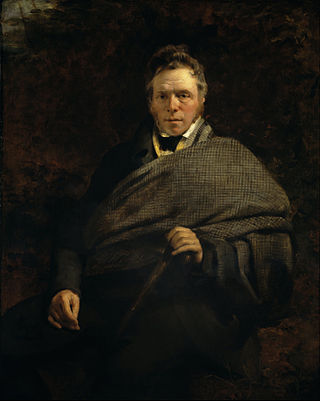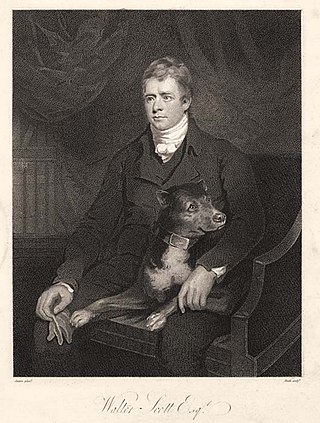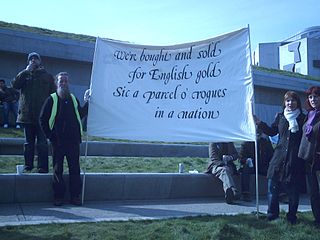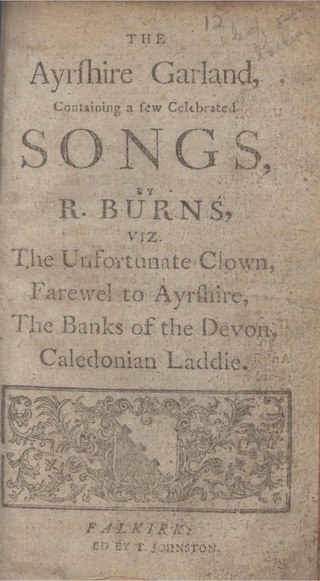Contents
- Births and deaths
- Births
- Collections of songs or music
- External links
- Digitised copies from National Library of Scotland

The Scottish Enlightenment was the period in 18th- and early-19th-century Scotland characterised by an outpouring of intellectual and scientific accomplishments. By the eighteenth century, Scotland had a network of parish schools in the Scottish Lowlands and five universities. The Enlightenment culture was based on close readings of new books, and intense discussions which took place daily at such intellectual gathering places in Edinburgh as The Select Society and, later, The Poker Club, as well as within Scotland's ancient universities.

James Hogg was a Scottish poet, novelist and essayist who wrote in both Scots and English. As a young man he worked as a shepherd and farmhand, and was largely self-educated through reading. He was a friend of many of the great writers of his day, including Sir Walter Scott, of whom he later wrote an unauthorised biography. He became widely known as the "Ettrick Shepherd", a nickname under which some of his works were published, and the character name he was given in the widely read series Noctes Ambrosianae, published in Blackwood's Magazine. He is best known today for his novel The Private Memoirs and Confessions of a Justified Sinner. His other works include the long poem The Queen's Wake (1813), his collection of songs Jacobite Relics (1819), and his two novels The Three Perils of Man (1822), and The Three Perils of Woman (1823).

Scottish folk music is a genre of folk music that uses forms that are identified as part of the Scottish musical tradition. There is evidence that there was a flourishing culture of popular music in Scotland during the late Middle Ages, but the only song with a melody to survive from this period is the "Pleugh Song". After the Reformation, the secular popular tradition of music continued, despite attempts by the Kirk, particularly in the Lowlands, to suppress dancing and events like penny weddings. The first clear reference to the use of the Highland bagpipes mentions their use at the Battle of Pinkie Cleugh in 1547. The Highlands in the early seventeenth century saw the development of piping families including the MacCrimmons, MacArthurs, MacGregors and the Mackays of Gairloch. There is also evidence of adoption of the fiddle in the Highlands. Well-known musicians included the fiddler Pattie Birnie and the piper Habbie Simpson. This tradition continued into the nineteenth century, with major figures such as the fiddlers Niel and his son Nathaniel Gow. There is evidence of ballads from this period. Some may date back to the late Medieval era and deal with events and people that can be traced back as far as the thirteenth century. They remained an oral tradition until they were collected as folk songs in the eighteenth century.

Joseph Ritson was an English antiquary known for editing the first scholarly collection of Robin Hood ballads (1795). After a visit to France in 1791, he became a staunch supporter of the ideals of the French Revolution. He was also an influential vegetarianism activist. Ritson is also known for his collections of English nursery rhymes, such as "Roses Are Red" and "Little Bo-Peep", in Gammer Gurton's Garland or The Nursery Parnassus, published in London by Joseph Johnson.
David Herd was a noted Scottish anthologist of songs and ballads.
This is a timeline of the history of piracy.
William Thomson was a Scottish folk song collector and singer.
"A Red, Red Rose" is a 1794 song in Scots by Robert Burns based on traditional sources. The song is also referred to by the title "(Oh) My Love is Like a Red, Red Rose" and is often published as a poem. Many composers have set Burns' lyric to music, but it gained worldwide popularity set to the traditional tune "Low Down in the Broom"

Minstrelsy of the Scottish Border is an anthology of Border ballads, together with some from north-east Scotland and a few modern literary ballads, edited by Walter Scott. It was first published by Archibald Constable in Edinburgh in 1802, but was expanded in several later editions, reaching its final state in 1830, two years before Scott's death. It includes many of the most famous Scottish ballads, such as Sir Patrick Spens, The Young Tamlane, The Twa Corbies, The Douglas Tragedy, Clerk Saunders, Kempion, The Wife of Usher's Well, The Cruel Sister, The Dæmon Lover, and Thomas the Rhymer. Scott enlisted the help of several collaborators, notably John Leyden, and found his ballads both by field research of his own and by consulting the manuscript collections of others. Controversially, in the editing of his texts he preferred literary quality over scholarly rigour, but Minstrelsy of the Scottish Border nevertheless attracted high praise from the first. It was influential both in Britain and on the Continent, and helped to decide the course of Scott's later career as a poet and novelist. In recent years it has been called "the most exciting collection of ballads ever to appear."

"The Dowie Dens o Yarrow", also known as "The Braes of Yarrow" or simply "Yarrow", is a Scottish border ballad. It has many variants and it has been printed as a broadside, as well as published in song collections. It is considered to be a folk standard, and many different singers have performed and recorded it.
"Ye Jacobites by Name" is a traditional Scottish folk song which goes back to the Jacobite risings in Scotland (1688–1746). While the original version simply attacked the Jacobites from a contemporaneous Whig point of view, Robert Burns rewrote it in around 1791 to give a version with a more general, humanist anti-war, but nonetheless anti-Jacobite outlook. This is the version that most people know today and has been performed and recorded by Scottish folk groups such as The Corries and The McCalmans
The British folk revival incorporates a number of movements for the collection, preservation and performance of folk music in the United Kingdom and related territories and countries, which had origins as early as the 18th century. It is particularly associated with two movements, usually referred to as the first and second revivals, respectively in the late 19th to early 20th centuries and the mid-20th century. The first included increased interest in and study of traditional folk music, the second was a part of the birth of contemporary folk music. These had a profound impact on the development of British classical music and in the creation of a "national" or "pastoral" school and led to the creation of a sub-culture of folk clubs and folk festivals as well as influential subgenres including progressive folk music and British folk rock.

Cock Up Your Beaver is a song and poem by Robert Burns, written in 1792. It is written in Scottish dialect and the beaver refers to a gentleman's hat in an era when all high quality men's hats were made of felted beaver fur.

"Such a Parcel of Rogues in a Nation" is a Scottish folk song whose lyrics are taken from a poem written by Robert Burns in 1791, listed as number 5516 in the Roud Folk Song Index. It has continued to be associated with Scottish nationalism and also been referenced in other situations where politicians' actions have gone against popular opinion.

The Canongate Kirkyard stands around Canongate Kirk on the Royal Mile in Edinburgh, Scotland. The churchyard was used for burials from the late 1680s until the mid-20th century.

Scottish literature in the eighteenth century is literature written in Scotland or by Scottish writers in the eighteenth century. It includes literature written in English, Scottish Gaelic and Scots, in forms including poetry, drama and novels. After the Union in 1707 Scottish literature developed a distinct national identity. Allan Ramsay led a "vernacular revival", the trend for pastoral poetry and developed the Habbie stanza. He was part of a community of poets working in Scots and English who included William Hamilton of Gilbertfield, Robert Crawford, Alexander Ross, William Hamilton of Bangour, Alison Rutherford Cockburn, and James Thomson. The eighteenth century was also a period of innovation in Gaelic vernacular poetry. Major figures included Rob Donn Mackay, Donnchadh Bàn Mac an t-Saoir, Uillean Ross and Alasdair mac Mhaighstir Alasdair, who helped inspire a new form of nature poetry. James Macpherson was the first Scottish poet to gain an international reputation, claiming to have found poetry written by Ossian. Robert Burns is widely regarded as the national poet.

Music of Scotland in the eighteenth century includes all forms of music made in Scotland, by Scottish people, or in forms associated with Scotland, in the eighteenth century. Growing divisions in the Scottish kirk between the Evangelicals and the Moderate Party resulted in attempt to expand psalmondy to include hymns the singing of other scriptural paraphrases.
Events from the year 1725 in Scotland.

"The Wee German Lairdie" is a Scottish folk song that is probably about George I of Great Britain. The king, ridiculed in this song, assumed power to the discontent of the Jacobite rebels, who instead recognised James Francis Edward Stuart as king, from the formerly ruling House of Stuart. Though taking place around 1715, the song first appears in writing in 1810, in Robert Cromek and Allan Cunningham's Remains of Nithsdale and Galloway Song, recalling a song of several versions that was allegedly sung prior. James Hogg, however, mentions "an older collection" in the first volume of his 1819 compilation The Jacobite Relics of Scotland.